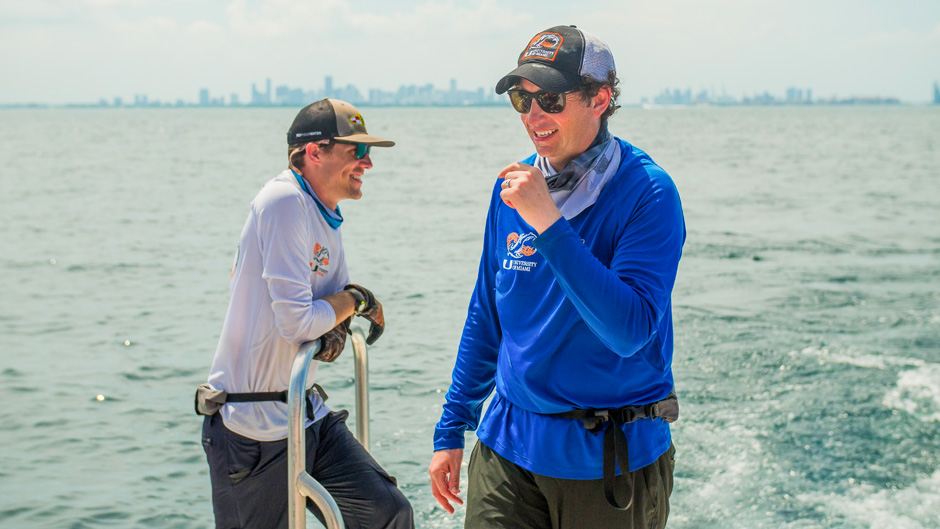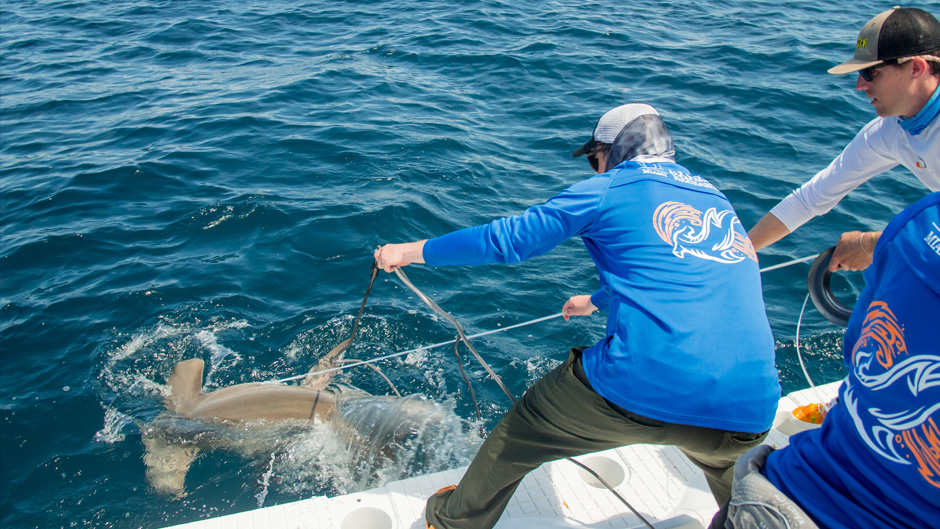The inspiration for one of marine ecologist Neil Hammerschlag’s most intriguing studies on sharks came not during a research cruise to Tiger Beach in Grand Bahama nor in his laboratory at the University of Miami’s Rosenstiel School of Marine, Atmospheric, and Earth Science, but while sitting in a commercial airliner thousands of feet in the air.
Hammerschlag was returning from a scientific symposium. And as the jet made its descent for a nighttime landing at Miami International Airport, he looked out his window to see a coastline illuminated by lights.
He knew that some animals like pigeons and racoons thrive in cities, while others such as wolves tend to be “urban avoiders,” staying away from big metropolitan areas. “But what about sharks?” Hammerschlag asked himself.
Research investigating the movements of ocean predators in relation to urbanization is rare, he knew. So, along with a team of colleagues, Hammerschlag tracked bull, nurse, and great hammerhead sharks in coastal waters near the city of Miami, finding, to his surprise, that the three species spent an abundance of time near the lights and sounds of the big city, often close to shore, no matter the time of day.
The study, Urban sharks: residency patterns of marine top predators in relation to a coastal metropolis, is just one example of the plethora of research that makes Hammerschlag one of the preeminent shark researchers in the world.
So, it is no surprise that National Geographic tabbed the researcher to provide expert commentary for the eight-episode show “Shark Attack Files,” which premieres July 18 as part of the network’s SharkFest series.
This year marks the 10th anniversary of the series dedicated to the science of one of the ocean’s top apex predators. As such, SharkFest—which would normally be limited to the networks Nat Geo, Nat Geo Wild, Nat Geo Mundo, Disney+, and Disney XD—has been expanded to ABC, ESPN, and Hulu to help air its largest programming slate ever.

Neil Hammerschlag
While SharkFest appeals to the mass audience with sensational show titles such as “Sharks that Eat Everything,” “Jaws vs. Boats,” and “Shark Kill Zone: The Hunt,” the series, and others like it such as Discovery’s Shark Week, do offer an invaluable educational component, according to Hammerschlag.
“It’s an opportunity to get people fascinated about sharks, but it’s also an opportunity to educate them,” he said. “I compare it to getting my dog to take a pill. I hide it in peanut butter so that he’ll swallow it. And that’s what I do in my contribution to these shows. I sneak in a little bit of fiber along with the sugar.”
Hammerschlag will also have a short appearance on Shark Week’s “Tracy Morgan Presents: Sharks! with Tracy Morgan,” which is set for its world premiere July 28 at 8 p.m. on Discovery and its streaming service, Discovery+.
And this year’s Shark Week will be packed with muscle, as University of Miami alumnus, actor, and philanthropist Dwayne “The Rock” Johnson will serve as master of ceremonies for the 34th installment of the series, which begins July 24.
While SharkFest is, indeed, entertaining, the real meat and potatoes of Hammerschlag’s work is his groundbreaking research conducted in the field. Like his study on sharks being affected by urbanization.
“It’s not at all what we expected,” he said of the urban study. “The sharks we tracked were spending lots of time near downtown Miami in the most polluted waters.”
Perhaps attracted to shore from land-based activities such as the discarding of fish carcasses, the sharks exhibited behavior that closely resembled that of “urban adapters,” Hammerschlag and his team noted. “But the concern is that those sharks are at risk from polluted waters and from all of the chemical, light, and noise contamination in the area,” he said.
Hammerschlag pointed out that it is crucial people be aware that sharks, like many other species, are being impacted by climate change. He led a study, for example, that reveals that the locations and timing of tiger shark movement in the western North Atlantic Ocean have changed because of rising ocean temperatures—climate-driven changes that have subsequently shifted tiger shark movements outside of protected areas, leaving them more vulnerable to commercial fishing.
Through his Shark Research and Conservation Program, he not only conducts cutting-edge shark research but also mentors children, taking hundreds of students on expeditions to survey, tag, and study sharks.
“We started with 20 kids participating in 2006, and now it’s nearly a thousand a year,” said Hammerschlag, adding that the trips provide an invaluable resource. “They promote an environmental ethic, and they inspire kids to not only appreciate science but also to potentially want to pursue careers in the STEM fields. They show that science can be cool and very engaging.”

